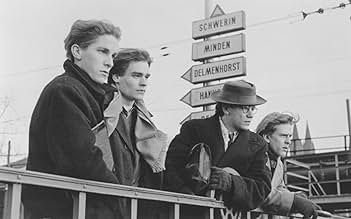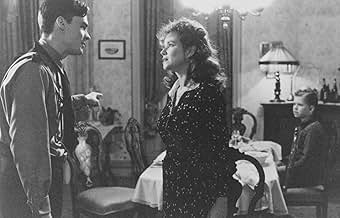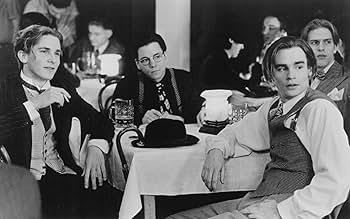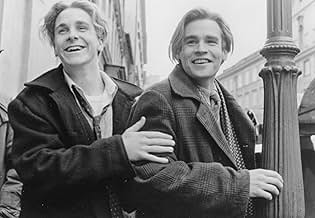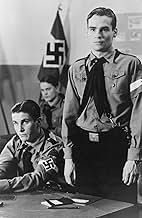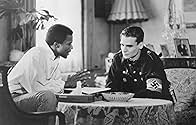IMDb-BEWERTUNG
6,8/10
17.637
IHRE BEWERTUNG
Eine Gruppe von Teenagern verehrt verbotene Musik in Nazi-Deutschland kurz vor Ausbruch des Zweiten Weltkriegs.Eine Gruppe von Teenagern verehrt verbotene Musik in Nazi-Deutschland kurz vor Ausbruch des Zweiten Weltkriegs.Eine Gruppe von Teenagern verehrt verbotene Musik in Nazi-Deutschland kurz vor Ausbruch des Zweiten Weltkriegs.
- Auszeichnungen
- 1 Gewinn & 1 Nominierung insgesamt
Jessica Hynes
- Helga
- (as Jessica Stevenson)
Handlung
WUSSTEST DU SCHON:
- WissenswertesDespite the fact that Kenneth Branagh plays a major role in this movie, he is uncredited. Reportedly, Branagh refused to be credited out of concern that he would be billed above Robert Sean Leonard, Christian Bale, and the other boys, whom Branagh proclaimed were the real stars of the film.
- PatzerIn an establishing shot just after the Nazis steal the radio, the rear half of a Vauxhall Wyvern can be seen parked on the street; this car was not introduced until 1948.
- Zitate
Arvid: I would rather belong to any one... ANYONE, than belong to the Nazis like you do.
Thomas Berger: That's because you have everything backwards. Nazis go anywhere they want, do anything they want, everyone gets out of our way.
Arvid: Quiz time. Got your glasses on.
Thomas Berger: What?
Arvid: It means you don't know who your friends are.
- SoundtracksLife Goes to a Party
Written by Harry James and Benny Goodman
Ausgewählte Rezension
Four German teenage boys (Leonard, Bale, Whaley, and Batrok), living under Nazy reign in World War II, secretly play Swing music, American stuff that's been forbidden, and embrace the concepts of the musical heritage. But this is clearly an act of rebellion, so they must do it in secret clubs at night, avoiding the Gestapo. Their relationships and the outcomes are the study of this film, which is both uneven and, ultimately, very powerful.
Roger Ebert detested this film for the fact that, to him, is unclear in it's message. He feels that the motives behind these teen's rebellion are stupid: It seems as if Hitler hadn't banned Swing music, then they would have thought that he was a swell guy.
Actually, this observation on Mr. Ebert's behalf might be the film's point. They thought Hitler was a loser because of he didn't let them play their music. Through this fact, they learn that there is a much bigger problem here, and they know that they can't conform to it. So how do they rebell? Through the music that they cherish.
Along the way, two of the boys, Leonard and Bale, are forced to join the Gestapo. Leonard doesn't embrace the teachings, but Bale is slowly brainwashed into conforming. Whaley is a cripple, and he therefore observes the Nazis from a different position. He soon begins to despise his two friends for their uniforms. While his character might be an arrogant jerk, it is clear that he's got a better idea about the evil that's going on than anyone else. Bartok is just sort of along for the ride, just wanting to hang out with his friends and play in his music...oblivious to what happens with the Jews or Nazis.
So here we have four chief characters that pretty much represent probably the most basic attitudes of German citizens during the war: Brainwashed, aware, torn in between, and indifferent. The characters are well acted, and the balance and chemisty between them work. The message at the end is very clear and VERY powerful....I am often reminded of its subtle excellence, though I haven't seen it in a good while.
Unfortunately, the film itself is uneven. Almost too much time is spent on the swing music itself. So much that it takes away from the message of the film. The music should have only served as a backdrop, and endless scenes of dancing almost threaten to take away from the impact of the theme. "Almost" is the key word. All in all, this is a most intriguing film. Kenneth Branagh appears unbilled, as a central Gestapo character.
*** out of ****
Roger Ebert detested this film for the fact that, to him, is unclear in it's message. He feels that the motives behind these teen's rebellion are stupid: It seems as if Hitler hadn't banned Swing music, then they would have thought that he was a swell guy.
Actually, this observation on Mr. Ebert's behalf might be the film's point. They thought Hitler was a loser because of he didn't let them play their music. Through this fact, they learn that there is a much bigger problem here, and they know that they can't conform to it. So how do they rebell? Through the music that they cherish.
Along the way, two of the boys, Leonard and Bale, are forced to join the Gestapo. Leonard doesn't embrace the teachings, but Bale is slowly brainwashed into conforming. Whaley is a cripple, and he therefore observes the Nazis from a different position. He soon begins to despise his two friends for their uniforms. While his character might be an arrogant jerk, it is clear that he's got a better idea about the evil that's going on than anyone else. Bartok is just sort of along for the ride, just wanting to hang out with his friends and play in his music...oblivious to what happens with the Jews or Nazis.
So here we have four chief characters that pretty much represent probably the most basic attitudes of German citizens during the war: Brainwashed, aware, torn in between, and indifferent. The characters are well acted, and the balance and chemisty between them work. The message at the end is very clear and VERY powerful....I am often reminded of its subtle excellence, though I haven't seen it in a good while.
Unfortunately, the film itself is uneven. Almost too much time is spent on the swing music itself. So much that it takes away from the message of the film. The music should have only served as a backdrop, and endless scenes of dancing almost threaten to take away from the impact of the theme. "Almost" is the key word. All in all, this is a most intriguing film. Kenneth Branagh appears unbilled, as a central Gestapo character.
*** out of ****
Top-Auswahl
Melde dich zum Bewerten an und greife auf die Watchlist für personalisierte Empfehlungen zu.
- How long is Swing Kids?Powered by Alexa
Details
Box Office
- Budget
- 12.000.000 $ (geschätzt)
- Bruttoertrag in den USA und Kanada
- 5.632.086 $
- Eröffnungswochenende in den USA und in Kanada
- 1.967.957 $
- 7. März 1993
- Weltweiter Bruttoertrag
- 5.632.086 $
- Laufzeit1 Stunde 52 Minuten
- Farbe
- Sound-Mix
- Seitenverhältnis
- 1.85 : 1
Zu dieser Seite beitragen
Bearbeitung vorschlagen oder fehlenden Inhalt hinzufügen



